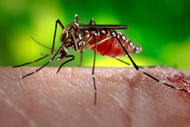Yellow fever virus:
Similar to West Nile virus, yellow fever virus (YFV) is another member of the Flaviviridae family transmitted by infected mosquitos. YFV was at one time endemic in the United States, and is still present in low- and middle-income countries, where infection can lead to mortality rates of 20-50%. The current live attenuated YFV vaccine was developed in 1936 and has not been modified or otherwise improved in over 50 years. According to the CDC, this vaccine causes 47 severe adverse events (defined as resulting in hospitalization, long-term disability, or death) per million vaccinations. More recent reports indicate that vaccine-associated neurological disease occurs at an approximate rate of 1 case per 10,000 vaccinations. YFV vaccination of infants <9 months of age has been contraindicated since the 1960’s due to high rates of vaccine-associated encephalitis in this age group. The overall mortality rate following YFV vaccination is estimated at 1 to 2 deaths per million doses. Further, YFV vaccination has been found to cause severe viscerotropic disease in a substantial number of patients >60 years of age (an incidence rate of approximately 1:50,000 doses administered) and these cases result in approximately 50% mortality. This indicates that YFV vaccination is not only contraindicated in infants, but is also not recommended in the elderly due to the increased risk of severe and life-threatening disease. Increased monitoring efforts have also documented several cases of vaccine-related fatalities in young, otherwise healthy adults with no known pre-existing immune deficiencies.
Approximately 250,000 US civilian travelers and 750,000 US military personnel are vaccinated annually for travel to YFV endemic countries. However, at this time there is no licensed alternative to live YFV vaccination, putting a substantial number of people at risk for adverse reactions. To help fill this unmet need, NTI, in partnership with Oregon Health & Science University, has secured funding from the National Institutes of Health for development of a safer, inactivated YFV vaccine. This vaccine is based on NTI’s proprietary HydroVax platform, which can deliver inactivated vaccine formulations appropriate for use in immunologically vulnerable individuals, in addition to other healthy populations. Through this project, NTI plans to advance a second-generation YFV vaccine that can be used safely across all potential vaccine recipients while still eliciting robust antiviral immunity.


